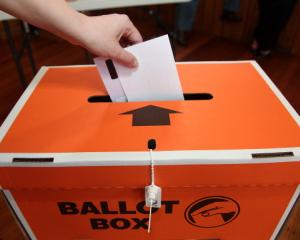This was the 13th games - billed as the largest multi-sporting event in New Zealand - to be hosted in Dunedin, as it alternates each year with Wanganui.
If the smiles, good-natured banter and general camaraderie among the almost 5000 competitors were any indication, Dunedin has again pulled off a successful event. Even the weather came to the party as competitors reached for the sunscreen as quickly as they did their water bottles.
New Zealanders love their sport and the attraction of the masters games is obvious.
It is a chance to relive those younger glory days, competing in your chosen discipline against people in the same age group.
It allows those long-suppressed competitive juices to again flow in some sharp-edged competition before relaxing and enjoying each others' company over a drink or meal.
For Dunedin, the games have proven to be something of a "mini boom'' and this year they were expected to inject an estimated $4.5 million into the local economy. An economic survey following the 2014 event showed each visitor to the city spent on average $716 during their stay.
The laid-back nature of the games means competitors come here to compete and party - not necessarily in that order - all the while spending largely on accommodation, food, drink and shopping.
Even better, many brought with them spouses, partners and supporters who add to the chorus of ringing cash tills.
The games also provide an excellent chance to showcase our city in a relaxed and friendly light. Something Dunedin traditionally does well.
The inaugural New Zealand Masters Games was held in Wanganui in 1989.
It was originally intended to be a biennial event but, with foresight, the Dunedin City Council bought the rights to host the event each alternate year and has done so since 1992.
John Bezett, chairman of the Dunedin (New Zealand) Masters Games Trust, said Dunedin initially eyed the games with the aim of attracting more visitors to the city.
Given at least half of the competitors taking part are from out of town, the decision has certainly achieved its goal.
Dunedin's ability to run a successful games has also not gone unnoticed at higher levels.
Dunedin has reached an agreement with the Wanganui sports body which runs the New Zealand Masters Games to secure hosting rights for 10 more events in Dunedin over the next 20 years.
Last week's event was the first under the new contract.
The success of both the Dunedin and Wanganui games was also a factor in New Zealand being chosen to host the World Masters Games in Auckland next year.
An estimated 25,000 competitors from 100 countries are expected to take part.
Dunedin and Otago are likely to see some tourism flow-on from that event.
Australia and New Zealand, as safe and laid-back countries, are seen as desirable places to host World Masters Games events and competitors relishing the chance to combine their love of sport and travel.
The number of participants at the Dunedin games, as at most long-standing events, has declined since the halcyon days of the 2002 games, which attracted 8120 competitors.
By 2008, competitors were down to 7069, dropping to 6400 in 2010 and about 5000 this year.
In 2008, the games ran at a loss of $150,000 which was met by the Dunedin City Council.
But all in all, the council has done the ratepayers a service by continuing to encourage the games in the city.
Its moderate investment over the years has brought in a regular visitor stream - and resulted in a significant economic impact.












